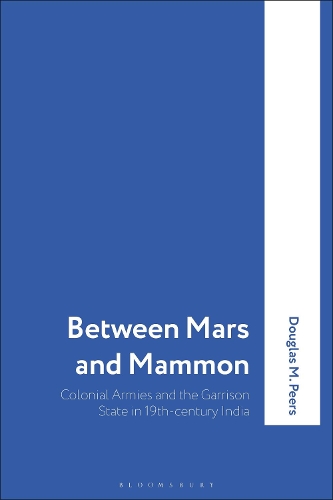
Between Mars and Mammon: Colonial Armies and the Garrison State in India, 1819-1835
(Paperback)
Publishing Details
Between Mars and Mammon: Colonial Armies and the Garrison State in India, 1819-1835
By (Author) Professor Douglas M. Peers
Bloomsbury Publishing PLC
Bloomsbury Academic
28th January 2021
United Kingdom
Classifications
General
Non Fiction
National liberation and independence
Asian history
Warfare and defence
954.03
Physical Properties
Paperback
296
Width 154mm, Height 234mm, Spine 22mm
460g
Description
While popular images of the British Raj are saturated with images and memories of military campaigns, remarkably few scholarly studies have considered the direct impact that the army exerted on the day-to-day operations of the British in India. Douglas Peer's book demonstrates not only how important the army was to the establishment of British domination but also to its subsequent form and operation. Soldiers and civilians, with rare exception, were united by the truism that British rule could only be retained by the sword. A rationale and a programme for the Raj emerged that emphasized the precariousness of British rule and showed that its security could only be assured by constant preparedness for war. Consequently, military imperatives and the army's demands for resources were given priority in peacetime as well as wartime. This accounts for the origin of the Burma War (1824-26) and the capture of Bhartpur (1825-26), neither of which would appear at first glance to be strategically vital or economically desirable. Authorities in London viewed this militarization of the colonial administration and its treasury with misgivings, recognizing not only the financial costs involved, but the political consequences of an increasingly autonomous army. Their efforts to restrain the army were only partially successful. Even William Bentinck (1828-1835), long famous for ushering in a period of reform in India, could only temporarily curb military spending and the influences of the army. He left the military chastened but undefeated; the army's interests were too deeply entrenched and even Bentinck was forced to concede Britain's dependence on the Indian army.
Author Bio
Douglas M. Peers is Professor of History at the University of Waterloo, Canada. He is the author of Between Mars and Mammon: Colonial Armies and the Garrison State in Early-Nineteenth Century India (1995) and India Under Colonial Rule, 1700-1885 (2006). He is also the co-editor, along with Nandini Gooptu, of India and the British Empire (2012), a companion volume in the Oxford History of the British Empire series. Douglas is a Fellow of the Royal Historical Society, and past president of the Canadian Association for Graduate Studies.
